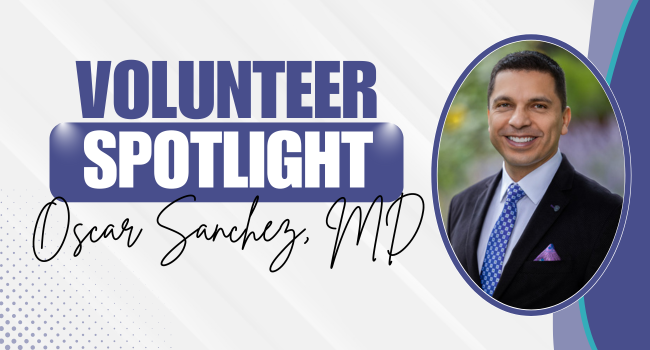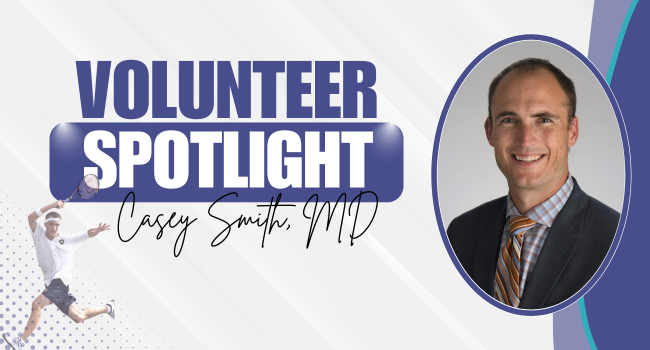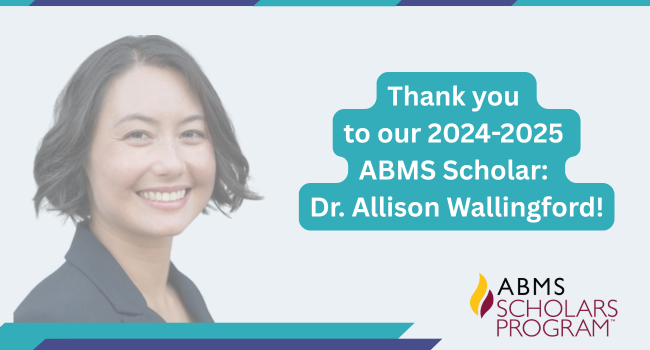Physician Features
Volunteer Spotlight: Dr. Oscar Sanchez

Tell us about yourself.
I am originally from Bogota, Colombia, and moved to the United States about 20 years ago. In Colombia, I attended medical school and worked as a general practitioner in an emergency room for the underserved population. To take my steps as a foreign doctor coming to the states, I matched with PM&R in Baylor College of Medicine where I did my residency. I spent some time in rural Nebraska doing pain management and then moved back to Houston to serve as an Assistant Professor at Baylor College of Medicine where I helped run the residency program as co-director. After a few years I moved to Denver to work with Kaiser Permanente, which is where I have spent the past 11 years. I helped develop their spine center and worked with neurosurgeons to do some great comprehensive treatments for those patients. That allowed me to strengthen my knowledge and experience, and I just passed the Brain Injury Medicine certification exam. An opportunity presented itself in California and I was ready for a new experience, so I now serve as the deputy chief for the PM&R department at the Tibor Rubin VA Medical Center. This is the first time I have done more of a formal administrative job, prior to this it was 100% clinical.
When you came from Colombia and decided to pursue medical school in the US, why did you choose PM&R?
My older sister is a PM&R doctor, and she inspired me. She worked as a PM&R physician in Colombia and then came to the states and pursued PM&R again. I did an observation in Houston and fell in love with the thoroughness and time you spend with patients. I feel very grateful that I got in.
This is your first role at a VA, were you wanting to work with veterans?
It’s interesting you ask that because I have learned that a lot of physicians move within the VA system, but I am entirely new to this. Each VA facility can manage it how they want, and the director wanted to change the ways they do things and bring in a fresh set of eyes to challenge the innovation and bring new ideas. I am excited to bring my ideas and experience, and I feel very supported by the leadership team and the team I supervise.
How did you get started volunteering with the ABPMR?
I started about five years ago doing the mock oral exams for the residents and now I am a Part II oral examiner. My experience has been good, I enjoy getting to network with other doctors and remain updated with clinical information. I can communicate with my residents and use my knowledge to help them and prepare them for what to expect not only with their board exams but also with how they are going to impact and communicate with peers and patients in the future. It helps me tie everything together. The ABPMR staff are very helpful, and they always take the time to send us a gift and thank us for our time. It is a nice touch and makes you feel recognized, so I appreciate that.
Do you see value in board certification?
I see a huge value in board certification, there is something important about standardization, right? I practice that every day, standardizing my practice so there is fairness, and we can track quality of care and within ourselves.
What do you enjoy doing outside of work?
I consider myself a coffee connoisseur. Back home, whenever you have a chance to talk with someone you do it over a cup of coffee. I miss that here; you don’t have as much time in your schedule to just slow down and enjoy a conversation over a cup of coffee. I love traveling, I just came back from a two-week cruise in the Mediterranean. I think it is important to disconnect from work and your regular life and just reset your mind. Traveling makes me humble because I can see my life from a different perspective.




